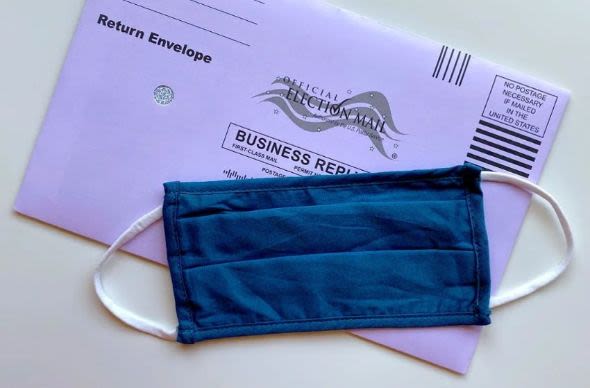Do I Need My Absentee or Mail-In Ballot Notarized?

By Jocelyn T.
Published on 01/28/2021
KEY TAKEAWAYS
- States like Alaska, Alabama require affidavit envelope to be signed before notary
- Mississippi has strict rules needing application and ballot signed in notary's presence
- Oklahoma limits notaries to 20 absentee ballots outside business, fees not allowed
As we get closer to the November 2020 general election, Notaries are getting inundated with requests to notarize absentee and mail-in ballots. There are a few states (listed below) where notarizations play a key role in the vote-by-mail process.
Alaska: Absentee ballot envelope affidavits must be signed in the presence of a witness - who may be a Notary Public, any officer authorized to administer oaths, or a person age 18 or older. The voter must complete the ballot, place it in the gray secrecy sleeve provided, and then place the secrecy sleeve containing the ballot inside the return mailing envelope. In accordance with the Alaska Administrative Code Title 6, Section 25.570[e], the witness must then sign their name on the witnessing affidavit on the return envelope. If an Alaska Notary acts as the witness, the notary must provide their oath, seal, and date on which the Notary’s commission expires in the designated location on the return envelope.
Alabama: Once an Alabama Absentee Ballot has been completed, it must be sealed in the provided plain envelope, with the envelope then being placed in another envelope with an affidavit printed on it. The voter must sign the affidavit on the envelope in the presence of a Notary Public, or two witnesses 18 years of age or older.
Mississippi: Mississippi has the strictest requirements of all the states. First the absentee ballot must be witnessed and signed by an official such as a Notary Public. The voter must complete and sign the affidavit on the application and the Notary must execute a jurat for the voter’s signature (Mississippi Code § 23-15-627).
Once the ballot has been received, it must be completed in the presence of a qualified attesting witness such as Notary Public, U.S. postmaster, or another authorized officer to take an acknowledgment. After the ballot is completed, the vote must fill out and sign the Elector’s Certificate on the back of the envelope. If a Notary acts as a witness, the Notary must sign the Attesting Witness Certificate on the back of the envelope, as well as provide their title and address. The Notary is not required to provide their seal, but the instructions for marking the ballot with the Notary as witness will be provided on the absentee ballot.
**Notaries are NOT allowed charge fees for notarizing absentee ballot applications or ballots**
Missouri: Voting by mail in Missouri for the November 2020 election falls into two categories: Absentee Ballots and Mail-In Ballots.
If you are a voter who qualifies to vote absentee (See Reasons Here), you will be required to sign the affidavit on the ballot envelope in the presence of a Notary. However, if you are incapacitated, confined due to a permanent disability, illness or physical disability, a voter covered under the Uniform Military and Overseas Voters Act, or just for the 2020 elections, a voter who has contracted or in the at-risk category of contracting COVID-19 do not need to get their Absentee Ballot notarized. A notary is NOT allowed to charge for notarizing an absentee ballot.
All mail-in ballots require the statement on the ballot envelope to be signed and sworn in front of a Notary. Contrary to Absentee Ballots, notaries may charge a fee to notarize a mail-in ballot, although the Secretary of State has provided a list of Missouri notaries who are offering free services for mail-in ballots (See List Here).

Photo by Element5 Digital on Unsplash
Oklahoma: A voter’s signature must be notarized on the absentee voter affidavit in the state of Oklahoma. Due to COVID-19, any absentee voter may attach a copy of a valid ID to the affidavit envelope as an alternative to getting it notarized. If you are a physically incapacitated voter, or at a high risk of contracting COVID-19, you may use 2 witnesses for the affidavit instead of going through the notarization process.
Oklahoma notaries are NOT allowed to charge a fee to notarize an absentee ballot affidavit, and they MUST keep a journal record of all absentee ballot affidavits notarized. The state of Oklahoma limits a notary to notarize up to twenty (20) absentee ballot affidavits outside the notary’s regular place of business during a single election. A notary must be given special permission from a county election board secretary to notarize more than twenty ballots.
South Dakota: Absentee ballot applications must be notarized with a jurat OR include a copy of an acceptable photo ID.
We highly recommend checking with your state to learn about all laws and regulations when it comes to mail-in and absentee ballots before sending in your ballot, especially considering COVID-19 protocols are ever so changing.
Updated Date: 03/05/2026
